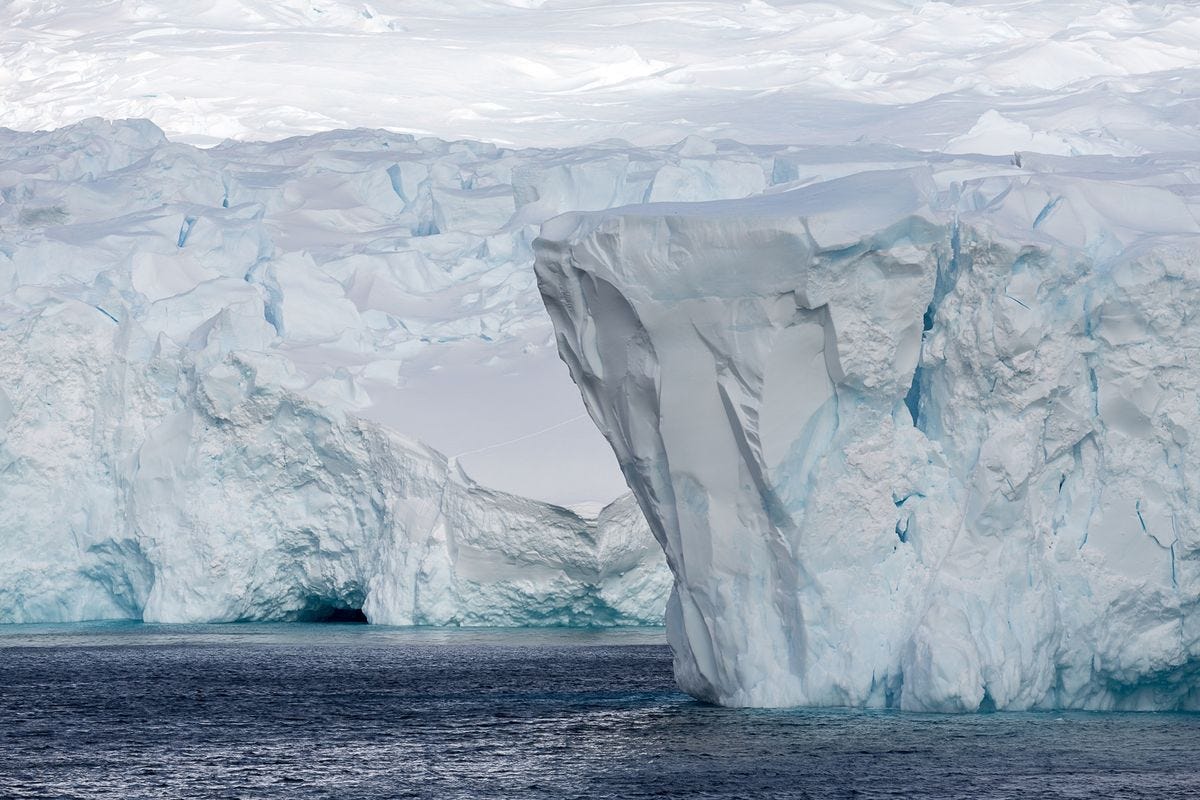“To become a mother now is to decide to love a world that’s disappearing. It is also to commit to helping it remain.”
Two weeks ago, we read The Quickening as part of my book club. It was great.
These are two enormous themes of the book—climate change and motherhood—and only a writer as talented as Elizabeth Rush could weave them together with such grace.
In the book, Rush takes us on a journey to Antarctica aboard the Palmer, a research vessel carrying scientists, glaciologists, and climate experts. Their mission: to get as close as possible to the Thwaites Glacier, which is at serious risk of melting and contributing to catastrophic sea level rise. But she also brings us deep into the intimate terrain of her own life, asking what it means to choose motherhood in the face of climate change.
I was drawn to the book not just because I want to stay informed about our changing planet, but also because of my own relationship to motherhood—a journey I haven’t shared here before. And to be honest, I’m not sure I ever will. In a world that often confuses transparency with value, where sharing everything is treated like currency, I believe some things are meant to be held close. Not hidden—but sacred. Some stories belong to those closest to you.
Nonetheless, the question that weaves the book together is one many of us can relate to: How do we choose to create—or not—in a world that feels increasingly uncertain?
Rush doesn’t offer easy answers. Instead, she invites us to sit with the uncertainty. To consider our options. Onboard the Palmer, surrounded by scientists mapping the melting Thwaites Glacier she listens closely. To data. To silence. To the ethics of witnessing change on a scale so vast it’s almost beyond comprehension. At times, I felt like I was right there with her—on the ship, wrapped in cold and quiet—stepping into a part of the world we know so little about, yet one that holds so many of the answers we need.
What struck me most was how she balanced that vastness with the quiet, inner work of deciding whether or not to bring a child into this world. Her decision is a slow, deliberate unfolding, shaped by grief, awe, and love, reassuring me on my most down days that the journey to becoming a mother brings up so many questions, and that it’s more than okay to meet those feelings with tenderness, not shame. After all, bringing life into this world is not just a personal decision—it’s a political, environmental, and deeply emotional one. It asks us to imagine a future, even when the future feels fragile. Rush doesn’t frame motherhood as a matter of hopefulness or resignation, but as something quieter and more complex: a form of care, a kind of faith, a commitment to remain present in the face of uncertainty. Her honesty reminded me that there’s strength in not knowing, and courage in choosing to love anyway.
As Rush reflects on her time near Thwaites Glacier, she writes: “I am trying to make a life in a time of collapse, not after it.” That line reminds us that collapse isn’t a distant event—it’s now. And while many of us are trying to do our part—recycling, decreasing our carbon footprint, resisting fast fashion—there’s still the quiet, unsettling truth that it might not be enough.
But even in that uncertainty, Rush offers something else—an invitation. “When we tell the story of collapse, we often forget to mention the parts where we learned to love what we still had.” That line, more than any other, stayed with me. It urged me to stay present. To look more closely. To love harder—not in denial of what’s disappearing, but because it’s still here. To remember that making this world more livable, more just, more beautiful is a collective act—rooted in care, attention, and love.
At times, I teared up—like when she witnessed the widest recorded glacier calve, a process in which massive chunks of ice break off the edge of a glacier and crash into the ocean. It’s a moment that signals not just environmental collapse, but our complicity in it—a heartbreaking reality made even harder to fathom given the current state of our country and the persistent lack of accountability. Other times, I found myself nodding, quietly moved by her vulnerability and tenderness. She doesn’t offer certainty—only presence. And in a world that so often demands resolution, that felt like a gift. Because while we have models and data telling us the planet is hurting, the truth is: we don’t really know what’s coming.
Reading The Quickening reminded me that we can hold both: the grief of what’s being lost and the courage to care anyway. That caring—whether through parenting, storytelling, or simply paying attention—is its own kind of resistance.
I’m still thinking about what it means to live, and maybe even create life, in a time of unraveling. Maybe you are, too.
I want to take a moment to thank you for being here. I know your inbox is full—there’s no shortage of content these days. So the fact that you choose to spend time with me means more than you know.
To all the new faces—welcome! I’m thrilled to have you. Here are a few helpful links to get you started:
Want to support a journalist? You can upgrade your subscription here or shop my curated books here (I’ll earn a small commission!).
Thank you for being here—each of you plays a part in my journalism journey. I truly appreciate you.





This line right here: “And to be honest, I’m not sure I ever will. In a world that often confuses transparency with value, where sharing everything is treated like currency, I believe some things are meant to be held close. Not hidden—but sacred.” Perfectly said.